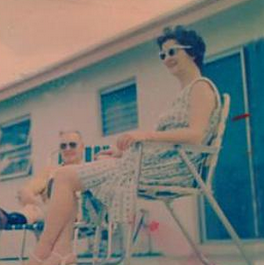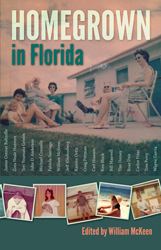
Homegrown in Florida
edited by William McKeen
University Press of Florida

Homegrown in Florida begins with a few lines from Marjorie Kinnan Rawling’s The Yearling, which you should read now. Don’t skip them:
It was not his own voice that called. It was a boy’s voice. Somewhere beyond the sink-hole, past the magnolia, under the live oaks, a boy and a yearling ran side by side, and were gone forever.
Okay, keep that vision in your mind’s eye, because that is Florida right there. Add to that carefree, unsupervised boy thirty mosquito bites that he doesn’t notice anymore, two skinless knees, a mask of dried up orange juice around sunburned lips flaking skin for days, and a thick following of swamp funk, and you’re halfway to feeling Florida, even at age 47.
McKeen’s collection goes a fair way to conjuring the feeling of growing up in Florida, gators and fishing rods taking position front and center, but more often reads like a collection of college application essays, stories saved up for this moment that some editor asks… And each of these writers did spend some time in Florida, mainly around Miami, which is not quite the same as Vero Beach or Fellsmere or Bradenton or Cocoa Beach or Haines City, and mostly for the few years before they hauled their bedspreads and Teflon pans to Gainesville to enroll in the MFA in Creative Writing program at UF. I’m oversimplifying. You’re smart. You get the picture.
Tim Dorsey and John D. Anderson (who lends an incredibly boring set of song lyrics) slip in the only mentions of orange groves, and nobody talks about the evil fire ants or Sun-In at all, and really, there are far too few mosquitoes in these stories, but with only one exception, they’re decent snapshots of slices of Florida livin’. They just ain’t a whole pie, is my beef.
First, let’s talk about that exception, the one that nearly landed the book in the Pacific Ocean at the end of my right wrist. Kristin Harmel’s “My Field of Dreams” is purportedly about the author’s love of St. Petersburg’s minor league baseball games and her first job as the between-innings games chick, but eventually – it takes a while – morphs into a rambling crapfest about her first writing gig at the tender age that she mentions more than a few times. To put the finish on our gastric distress, she ends with a petulant lambasting of an unnamed female publicist who apparently “seemed to hate [her] on sight,” most likely because the cub reporter was a woman(child). Kristin, honey, that probably had nothing to do with your female-ness. I’m guessing that publicist had just read some of your terrible-ass stories. Apparently people buy Harmel’s novels, and reviewers are nice to her. If you doubt me, you’ll need to look up her website, which leaves out not one detail of her rampant success – I don’t think she mentions her age anymore, though. Skip her story and save yourself the urge to fling.
That over, I can tell you that McKeen’s own Miami military family stories, “Why Chuck Wouldn’t Get out of the Car” and “Arsenal,” are among the best of the bunch, and I have a soft spot for Tom Petty’s “When the King Came to Ocala.” Bill Maxwell’s “Crescent City” and Boaz Dvir’s “The Only Israeli in Town” eloquently illuminate the racist redneck side of Florida, and Glen Simmons and Loren G. “Totch” Brown nearly take the whole damned cake with their down-home simple “Rambling Round” and “Giving Up the River,” respectively. That there is storytelling, folks, and that there is Florida.
It’s not a bad read, but you might enjoy it more if you weren’t actually homegrown in Florida yourself.












